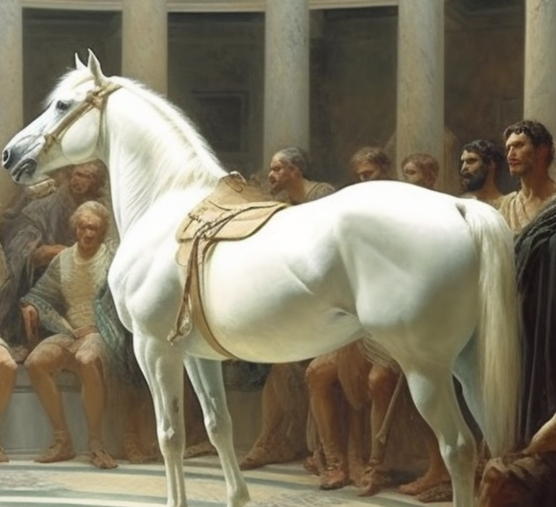
Caligula's attempt to make his horse, Incitatus, a consul is the most bizarre and infamous episode of the Roman Empire,
This is often cited as a symbol of the emperor’s eccentricity and erratic behavior. The story, however, is shrouded in uncertainty and may have been exaggerated or even fabricated by later historians, but it offers an intriguing glimpse into the dynamics of power and politics during Caligula’s reign.
The Story of Incitatus as Consul
According to ancient sources, Caligula’s horse, Incitatus, was not just a beloved pet, but also the subject of extravagant attention. The horse reportedly had a marble stall, an ivory manger, and even a house with a retinue of servants. Some sources even claim that Incitatus was fed oats mixed with gold flakes and was provided with a palace-like setting.
The most famous claim, however, is that Caligula proposed making Incitatus a consul, a high-ranking office traditionally held by Roman nobles. The consuls were responsible for leading the Roman army, administering justice, and serving as chief diplomats. Their role was not just administrative but deeply symbolic, representing the leadership and authority of the Roman Republic (and, later, the Roman Empire).
Why Did Caligula Do This?
Historians are divided over the motivations behind this extraordinary proposal. Several theories exist:
-
Mockery of the Senate: Caligula’s actions were likely a form of political satire aimed at the Senate. By proposing that a horse become a consul, Caligula may have been mocking the Senate, suggesting that they were as useless and ineffective as a horse in fulfilling the role of a consul. This fits with his broader disdain for the Roman aristocracy and his frequent clashes with the Senate.
-
Consolidation of Power: Caligula might have been attempting to reinforce his absolute control over the Roman political system. By elevating a horse to such an important office, he could be sending a clear message that he held the power to manipulate and control the institutions of Rome, regardless of tradition or logic. It also could have been a way of showing that no one in the Senate could oppose him, as even an animal was placed above them.
-
Insanity or Excess: Caligula’s reign was notorious for excess, cruelty, and unpredictable behavior. His relationship with the Senate was already strained due to his autocratic rule, and his reign was marked by a series of lavish and bizarre acts. Making his horse a consul could have been another example of his apparent madness, or it may have been an expression of his belief that traditional Roman structures were irrelevant to his supreme power.
-
A Symbol of Caligula’s Ego: Caligula might have seen his horse as a symbol of his own godlike status. Roman emperors often portrayed themselves as divine or semi-divine figures, and the idea that he could bestow such a prestigious title upon an animal might have been part of a broader narrative of his unchallenged supremacy.
The Senate’s Reaction
Whether Caligula followed through with the appointment or whether it was a purely symbolic gesture, the Senate’s reaction to the horse consul proposal was one of deep concern and alarm. Many senators were already fearful of Caligula’s unpredictable rule, and this act only deepened their anxiety. Some sources claim that the proposal was an attempt to humiliate the Senate and demonstrate just how powerless they were under his reign.
The Legacy of Caligula’s Horse
The story of Incitatus as consul has become a symbol of both the excesses of imperial Rome and the sometimes absurd nature of absolute power. It highlights the emperor’s strained relationship with the traditional power structures of Rome, including the Senate, which could not oppose him without risking their lives.
Although we may never know the full extent of the truth behind the story, it has been immortalized in the historical narrative as one of the most absurd and emblematic moments of Caligula’s reign. Whether it was a genuine proposal, a political statement, or a fabrication by later historians seeking to discredit the emperor, it remains one of the most enduring anecdotes about the perils of absolute power.
Historical Context
Caligula's reign lasted only four years (AD 37-41), but it was a period marked by extreme cruelty, public excess, and power struggles. Caligula began his rule with some popularity, but as time went on, his decisions became increasingly erratic.
The political climate was marked by fear, mistrust, and unease, as Caligula's actions seemed to grow increasingly unpredictable." Caligula's reign eventually became characterized by extravagance, cruelty, and capricious behavior, setting the stage for the infamous horse consul proposal.